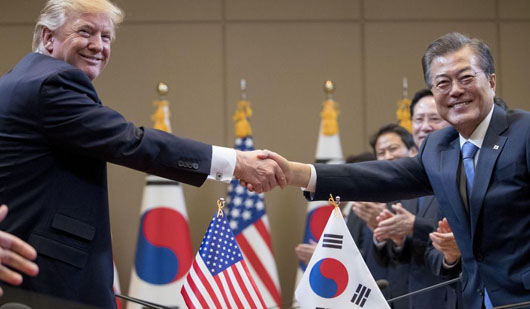by WorldTribune Staff, November 10, 2017
South Korean Foreign Minister Kang Kyung-Wha, in a bow to China, has said Seoul will not seek any more deployments of the U.S. THAAD missile defense system.
Kang also assured that the South will not join the U.S. missile defense networks nor seek a trilateral alliance involving Japan, Yonhap reported on Nov. 10.

Conservative strategists have long regarded a strong U.S.-Japan-South Korean alliance as critical to checking the military ambitions of communist allies China and North Korea.
“Both sides shared the view that the strengthening of exchange and cooperation between Korea and China serves their common interests and agreed to expeditiously bring exchange and cooperation in all areas back on a normal development track,” Seoul’s foreign ministry said in a statement.
The so-called “three-no principle” drew mixed responses in South Korea, with some observers saying it was a realistic decision to move Seoul-Beijing ties forward, while others said it was nothing more than a “humiliating” statement to curry favor with Beijing over Seoul’s sovereign rights, the Yonhap report said.
South Korean President Moon is scheduled to hold a summit with Chinese President Xi Jinping in Vietnam this weekend on the margins of the Asia-Pacific Economic Cooperation (APEC) meeting.
Moon, the South’s first left-leaning president in a decade, completed his first six months in office having seen his plan for peace on the divided Korean Peninsula all but evaporate.
Four days after his May 10 inauguration, North Korea test-fired a Hwasong-12 intermediate-range ballistic missile into the East Sea.
“It was considered a slap in the face to Moon, who has sought a speedy improvement in inter-Korean ties despite criticism from many conservatives here,” Yonhap said.
The North has since launched nine more ballistic missiles of various types, including the Hwasong-14 intercontinental ballistic missile (ICBM) and, on Sept. 3, carried out a sixth nuclear test.
Pyongyang also ignored Moon’s offer of military talks on easing border tensions and resuming separated family reunions.
Opposition parties accused Moon of being “too naive,” arguing that South Korea is being sidelined by regional powers when it comes to the North Korea issue, which critics call “Korea Passing.” The critics labeled Moon’s national security team as incompetent.
Moon’s national security adviser Chung Eui-Yong, refuted the critics’ claim, telling lawmakers that the current administration has “inherited the worst diplomatic and security circumstances from the previous government.”
The Moon administration saw a silver lining in what it said was the new president’s forging of a relatively good personal relationship with U.S. President Donald Trump.
In a joint press conference with Moon on Nov. 7, Trump said South Korea is “very important to me. And there will be no skipping South Korea… Plus, I’ve developed great friendships, not only with the president but with others.”
Subscribe to Geostrategy-Direct __________ Support Free Press Foundation
